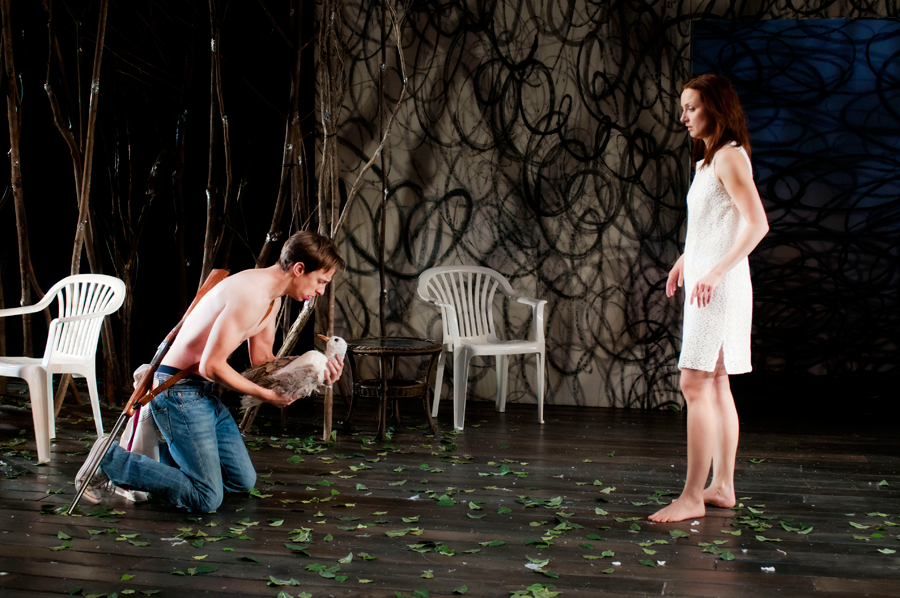In Tom Stoppard’s introduction to his English translation of Anton Chekhov’s The Seagull, he writes, “You can’t have too many English language versions of The Seagull.” Although he very well may have written those words in the interest of stressing the relevance of his translation—particularly given the plethora of other English translations which were already in existence—his words certainly seem validated by director Peter Hinton’s new adaptation, currently playing at the Segal Centre.
Hinton’s rendition of Chekhov’s classic sets the drama in the contemporary world and convincingly makes the case for its continued relevance. Certain details and interactions from Chekhov’s work have been changed to reflect the production’s setting in the modern sphere. Masha (Krista Colismo) smokes marijuana instead of consuming snuff; Sorin, male in Chekhov’s original, has become the female Sorina (Diane D’Aquila); the track suits, t-shirts, and spandex worn by the characters (designed by Montreal English Theatre Award-winner Eo Sharp), as well as the contemporary music throughout further emphasize Hinton’s decision to set his adaptation in the present.
Sharp’s set also helps to establish the play’s modernity. The jumble of white plastic beach chairs that line the center of the stage at the beginning of the drama inform the audience of the play’s time frame right away. The stylized disarray in which the chairs are scattered suggests the influence of abstract art, as do the black scribbles across the grey canvas which provides the backdrop for much of the play’s action. Sharp’s use of abstraction effectively situates the play’s deconstruction of what it means to be an artist within the context of the modern art world. Though artistic styles have changed, Sharp seems to suggest, Chekhov’s messages about the lives of artists continue to resonate.
Despite the strong influence of modernity, Hinton maintains the essential plot arc and character traits of Chekhov’s original. Constantine (Patrick Costello) still wrestles with discovering his identity as a writer while also trying to win the approval of his love interest, Nina (Shannon Curie), and his mother, Arkadina (Lucy Peacock). Constantine hopes to impress Arkadina and her lover Trigorin (Marcel Jeannin) with a production of his avant-garde play on Sorina’s estate, which features Nina as an actress and brings the rest of the ensemble together to watch. Things go awry when Arkadina interrupts the play by mocking it, and the incident sets into motion the family and relationship struggles which comprise many of the play’s essential conflicts.
The ensemble beautifully draws out the ire and agony at the root of these conflicts, as well as the illusions that the characters have about each other and their features. The longing to experience each other’s lives, which Curie and Jeannin express, increases the impact of the pain they feel later on when their fantasies are shattered by reality. Curie and Jeannin also convincingly portray the romantic chemistry that develops between Nina and Trigorin as a result of their idolization of each other. Costello effectively conveys his pining both for Arkadina’s approval and a career as a writer.
Ultimately though, Peacock’s performance makes her stand out from the rest of the ensemble. She brings out both the outside flamboyance that spills over from Arkadina’s stage persona into her everyday life and the cruelty of her abuse of Constantine. Despite the intensity of her portrayal of Arkadina’s faults and diva-like behavior, Peacock also manages to humanize her and allow the audience to sympathize with her.
Peacock, along with the rest of the ensemble, helps to make Hinton’s ambitious undertaking flow and feel less audacious than it is. Though some traditionalists will certainly still scoff at the idea of a modernized Seagull, Hinton and his actors have crafted a version of Chekhov’s classic which brings it into the present day without modifying its themes or sentiment. Certainly, the struggles of making a living as an artist have changed given the increased modes of distribution that exist and the effects which they have on artists; Hinton’s adaptation provides a fascinating look at how Chekhov’s characters would have reacted to the contemporary milieu.
The Seagull will be performed everyday except Friday until Feb. 19 at the Segal Centre (5170 ch. de la Côte-Ste-Catherine). Showtimes and ticket prices vary.









